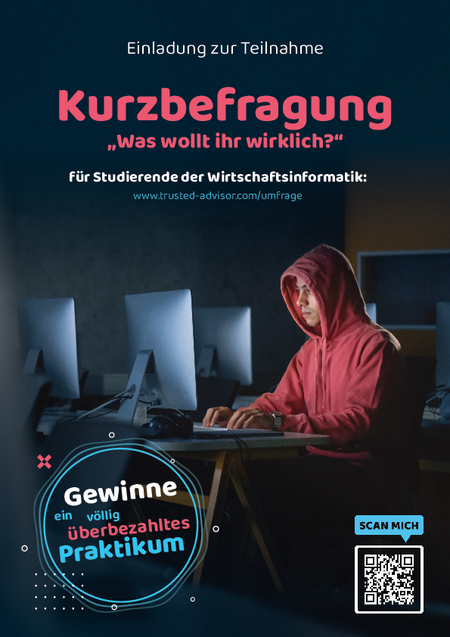2022
2022
News 2022
09.12.2022: Jose Daniel Alvarez Coello successfully defends his dissertation
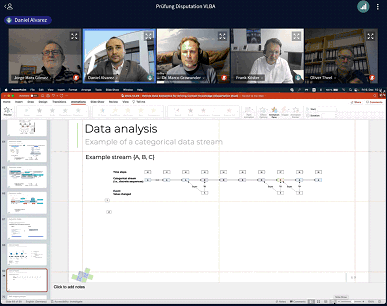
On December 9, 2022, Jose Daniel Alvarez Coello successfully defended his dissertation with the title „Vehicle Data Semantics for Driving Context Knowledge ". The Department of Information Systems VLBA congratulates him.
06.12.2022: Jakob Nonnenmacher successfully defends his dissertation
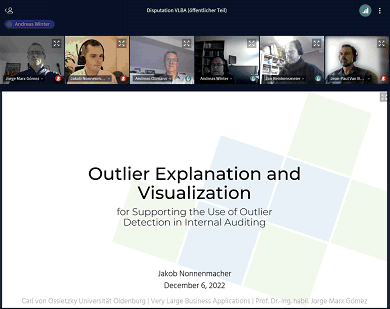
On December 6, 2022, Jakob Nonnenmacher successfully defended his dissertation with the title "Outlier Explanation and Visualization for Supporting the Use of Outlier Detection in Internal Auditing". The Department of Information Systems VLBA congratulates him.
25.11.2022: ICTA-EMoS Conference brings experts together
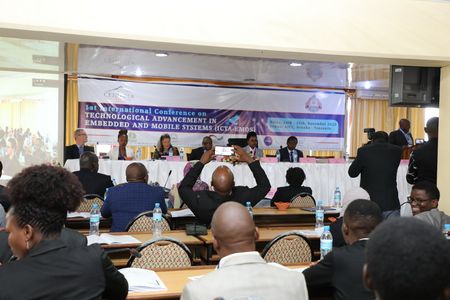
From 24 to 25 November 2022, the 1st International Conference on Technological Advancement in Embedded and Mobile Systems (ICTA-EMoS), held at the Arusha International Conference Center (AICC) in Tanzania, successfully opened the series of bi-annual scientific and technological conferences planned for the future. The conference was organized by the Nelson Mandela African Institution of Science and Technology, Arusha, Tanzania in collaboration with the Carl von Ossietzky University of Oldenburg, Germany and all implementing partner institutions from the Centre of Excellence for ICT in East Africa (CENIT@EA).
The first ICTA- EMoS Conference provided a hybrid platform for academia, industry, and policymakers to strengthen their ties for strong regional development and integration. Participants at the conference made ample use of this with inspiring keynote speeches, tutorials, and scientific workshops.
At the core of the conference, 78 scientific articles were presented by their authors orally or in poster presentations. Like the whole conference, the papers dealt with four major topics: Smart Systems Development, Artificial Intelligence Tools and Applications, Ethics in Information Systems and Cognitive Informatics and Wireless and Mobile Computing. The ICTA-EMoS conference received articles from all over the world, from Europe, Africa, Asia, North America or South America, that had gone through rigorous reviews leading up to the conference.
The Vice Chancellors of the partner universities of the Academic Consortium of dSkills@EA from EAC personally participated or were represented in the ICTA-EMoS conference. The organizers welcomed representatives from the University of Dar es Salaam in Tanzania, the University of University of Technology and Arts of Byumba in Rwanda; Moi University in Kenya and Kabale University in Uganda. Additionally, from the region the University of Juba in South Sudan and the University of Burundi were also in attendance.
The conference was organised within the framework of the project Digital Skills for an Innovative East African Industry (dSkills@EA) and received strong support from the dSkills@EA implementing partners institutions EAC, IUCEA, DAAD, GIZ who also participated in the conference. The conference was further supported through generous sponsorships from industry partners in East Africa and Germany.
16.11.2022: Kurzbefragung für Studierende der Wirtschaftsinformatik
Welche Karriereziele haben Studierende der Wirtschaftsinformatik heute wirklich?
In einer anonymisierten Online-Kurzbefragung wollen wir das herausfinden:
Geht es den heiß begehrten Young Professionals hauptsächlich um Prestige, hohes Gehalt und einen sicheren Arbeitsplatz? Oder zählen für die Absolvent*innen der Wirtschaftsinformatik vermehrt auch Dinge wie ausgeglichene Work-Life-Balance, psychische Gesundheit, Nachhaltigkeit und Selbstverwirklichung?
Kurzbefragung „Was wollt ihr wirklich?“
für Studierende der Wirtschaftsinformatik:
www.trusted-advisor.com/umfrage
09.11.2022: Save the date: Hybrid Embedded & Mobile Systems Conference, 24 – 25 November 2022
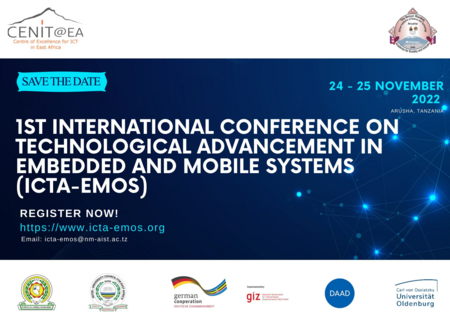
The 1st International Conference for Technological Advancement on Embedded and Mobile Systems (ICTA-EMoS) will be held on 24th -25th November 2022 in Arusha, Tanzania.
ICTA-EMoS will gather scientists, engineers, researchers, technicians, and industrial representatives to present cutting-edge studies on Embedded and Mobile Systems. Together they will form an interdisciplinary forum to discuss the scientific and engineering issues that arise from the ever more complex systems for the applications of the future world.
The ICTA-EMoS conference will be organized in a hybrid mode i.e. both physical and virtual attendance is possible. Registration is open through the following link: https://icta-emos.org/registration.
ICTA-EMoS is part of the project “Digital Skills for an Innovative East African Industry, dSkills@EA, at the Centre of Excellence for ICT in East Africa (CENIT@EA) located at the Nelson Mandela African Institution of Science and Technology (NM-AIST). VLBA heads the academic part of the centre and the project together with NM-AIST.
13.10.2022: Felix Kruse successfully defends his dissertation
On October 13, 2022 Felix Kruse successfully defended his dissertation with the title "End-to-End Data Integration of Real World Entities". The Department of Information Systems VLBA and the OFFIS institute congratulate him.
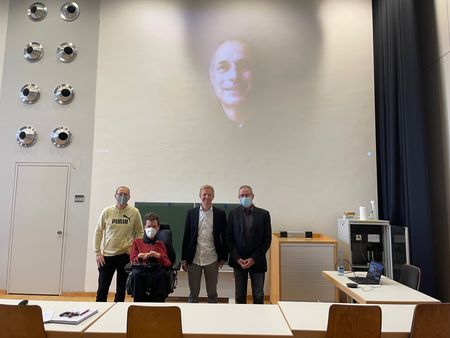
06.10.2022: Tanzanian Colleagues visit VLBA
Colleagues from the Nelson Mandela African Institution of Science and Technology (NM-AIST) visited the Department for Very Large Business Applications (VLBA) from 4 – 6 October 2022. During their stay they had an intense exchange with colleagues from different department at our university to get input for creating or strengthening similar institutions at their home university and developed several action items.
The topics covered during the visits were four key components of the joint German-East African project dSkills@EA – Digital Skills for an Innovative East African Industry: a Research Hub, an Entrepreneurship Hub, an Alumni Network and a Didactical Centre. There for elements ar to be implemented or strengthened at NM-AIST during the project. The following representative from NM-AIST attended the exchange:
- Dr Efraim Kosia, Chief Academic Officer and Head of the Academic Department
- Rebecca Magomere, 3rd Cohort Student Embedded and Mobile Systems, co-founder of student Embedded Club
- Dr Edna Makule, Research & Innovation Unit Head
- Dr Janeth Marwa, Entrepreneurship lead, School of Business Studies and Humanities (BuSH)
- Dr Elizabeth Mkoba, Entrepreneurship lead, School of Computational and Communication Sciences and Engineering (CoCSE)
- Dr Devotha Nyambo, Industry Lisaison/CENIT@EA
During they stay they met with the Graduate School Science, Medicine and Technology (OLTECH) to discuss support for students to enhance their scientific independence and career planning. From a meeting with the OLDIES club, an alumni organization for Computer Science graduates at UOL, they took home impulses to further develop the alumni work at NM-AIST. With the Study and Counselling Service at the university they discussed the promising activities and offer to help students find employment. Transfer as the third pillar of modern universities featured heaviliy on the guests’ agenda. From a personal presentation by Hauke Precht, team member of VLBA and co-founder of blockchain endeavor HAPTIK, they received helpful insights into the founding process at UOL. The Entrepreneurship Hub at the university, giz, gave them the bigger picture of institutional support for entrepreneurship, while the Endowed Chair of Entrepreneurship covered research into entrepreneurship.
The visits provided the impetus for further intensive cooperation between colleagues from Germany and Tanzania in the various areas. In the course of all meetings, concrete points of contact for further cooperation were identified.
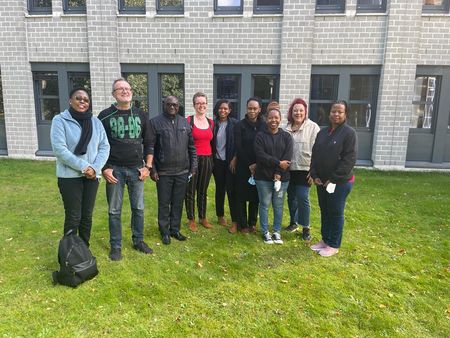
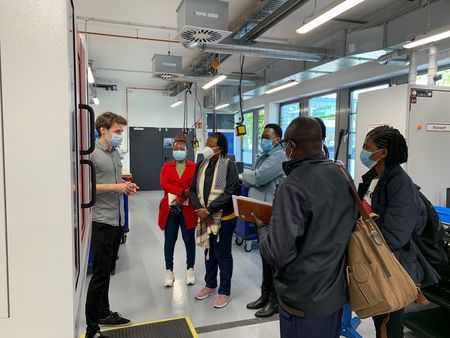
30.09.2022: Tanzanian CENIT@EA Centre Lead and Dean visit Oldenburg
From 19 – 30 September 2022, the VLBA department welcomed Prof. Kisangiri Michael, Centre Lead at the Centre of Excellence for ICT in East Africa (CENIT@EA), and Dr. Mussa Ally Dida, Dean of the School of Computational and Communication Science and Engineering (CoCSE), both at Nelson Mandela African Institution of Science and Technology (NM-AIST) in Arusha, Tanzania. During their stay, their participated in a Teach-the-teacher module on SAP S4/HANA and got to know the research landscape at the University of Oldenburg.
Teach-the-teacher at CENIT@EA
One of the objectives of our Centre of Excellence for ICT in East Africa (CENIT@EA) that our department coordinates academically is to increase and apply the institutional quality at the Centre and ensure practice-oriented teaching. To this end, teaching staff is to be trained via Teach-the-Teacher approaches, competence, and skill development. This includes didactics, further trainings for teaching and administrative staff.
Getting to know SAP S4/HANA
With Prof. Kisangiri and Dr. Mussa, who is also the Deputy Centre Lead at CENIT@EA, the two leading representatives of the Centre participated in the Teach-the-teacher module on SAP S4/HANA to pass on their experience to their staff and fellow teachers and supervisors. Colleagues from the VLBA department who are experienced experts on the subject introduced their colleagues from Tanzania to the use of SAP S4/HANA in teaching contexts by involving them in their lectures during their stay and introducing the virtual learning environment SAP University Competence Centre (UCC) Magdeburg to them.
The UCC will allow them and their colleagues at NM-AIST to enrich their courses with various practice-oriented teaching and learning environments. Staff at NM-AIST and the students in the Master program for Embedded and Mobile Systems at NM-AIST will receive access to the UCC which will allow the students to practically implement learned processes based on SAP technologies.
Research for Research
The second focus of Prof. Kisangir`s and Dr. Mussa`s stay in Oldenburg was an exchange on research activities. The Centre of Excellence will start its own Research Hub during the remaining run of the project to be continued after the project`s runtime. For this purpose, Prof. Kisangiri and Dr. Mussa discussed research projects at the VLBA department with the responsible colleagues and visited partner organisations OOWV and Granny & Smith to deep-dive into the transfer activities of the department. They also met with colleagues fom COAST, the Research Centre for Environment and Sustainability at the University of Oldenburg. The intense exchanges from colleague-to-colleague can provide the basis to further sharpen and strengthen the research profile of NM-AIST.
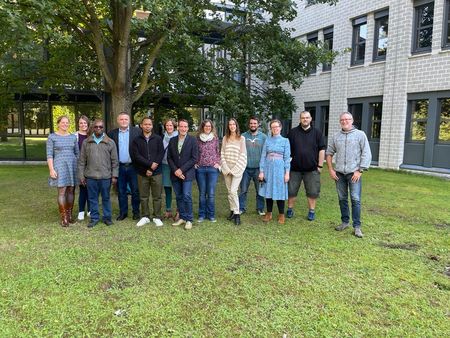
27.09.2022: BUIS-Tage 2022 successful in Hamburg
On Tuesday, 27.09.2022, the BUIS-Tage 2022 took place in Hamburg as part of the Informatik 2022. In three sessions led by Prof. Dr.-Ing. Jorge Marx Gómez, Prof. Dr. Volker Wohlgemuth, Dr. Thomas Klenke and Dr.-Ing. Andreas Solsbach: Mobility, Mobility and Digitalization as well as Corporate Environmental Management Information Systems, a wide variety of ideas, approaches and implementations were presented and discussed in eighth presentations. The digital conference book is available here (starting on p. 763 you will find the contributions of the BUIS Days 2022). We thank all speakers and participants for their active interest and would be pleased to welcome you at the BUIS-Tage 2023.
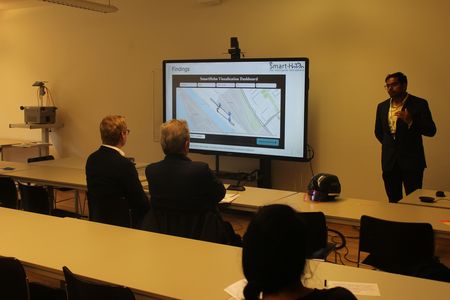
© Johannes Schering
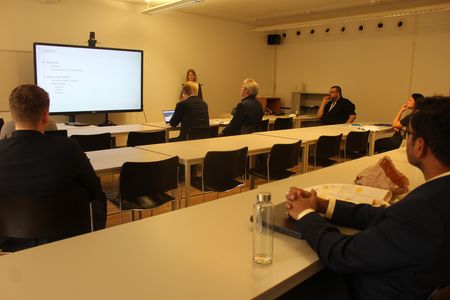
© Johannes Schering
19.09.2022: Abreise von Gastforscherin Gladys Nkatha Mange
Gladys Nkatha Mange ist Ende August zurück nach Kenia gereist. Sie war für 6 Monate als Gastforscherin in der Abteilung VLBA tätig.
Die Abteilung hat sich über den Besuch und den wissenschaftlichen Austausch sehr gefreut und wir wünschen ihr viel Erfolg bei ihrer zukünftigen Forschung.
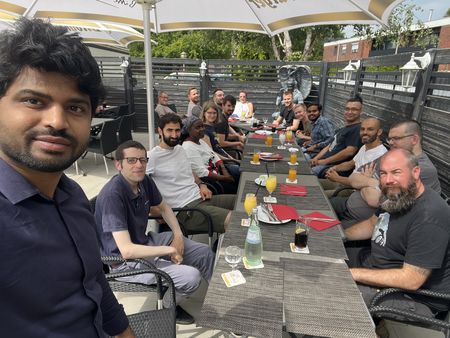
14.09.2022: Data Challenge 2022 - Final Event
In this year's Data Challenge 2022 nine students dealt with the development of models in the field of Data Science to solve a real practical system. In cooperation between VLBA, worldiety GmbH and Papier- und Kartonfabrik varel GmbH, a fault within a production process was to be predicted. The Data Challenge lasted for 14 days and the students were intensively supported by all participants during the period by answering open questions promptly in jourfixes or by e-mail.
In the final event, the interesting solution approaches and their results were awarded with a total of 2000 € in prize money by the practice partners.
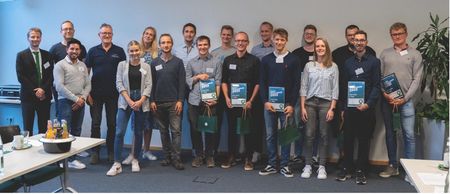
Source: worldiety GmbH
28.08.2022: Aufnahmetag bei Diephaus
On August 23, the first on-site appointment at our practice partner Diephaus in Vechta was scheduled. Steffen Meeuw, Julian Helms, and Rene Kessler drove together to Vechta to meet with Marcel Peplies, whose master thesis also deals with drone inventory, and the IT manager of Diephaus. The appointment was used to take new drone pictures and to test the GPS waypoint control, especially regarding the drone's integrated collision protection.
Pictures and videos were taken of specific aisles of the warehouse, since taking pictures of the entire warehouse (see cover photo) would have been too time-consuming. These shots were taken to train the computer vision models. Pictures were taken in the front view and in the top view. Two different drones were used at the same time.
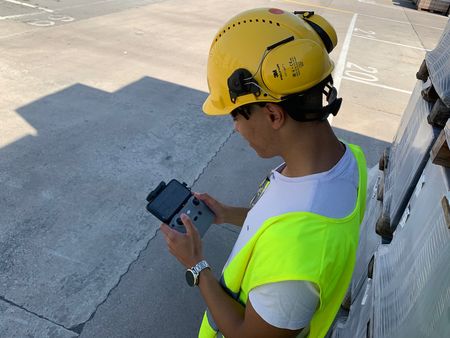
More exciting, however, was the test of the GPS waypoint control regarding collision protection. For the GPS waypoint control, a third-party app was used in which the waypoints were manually defined on site (a more detailed description of the process can be found in the blog post "Aufnahmetag bei Getränke Essmann").
While creating the waypoints, the group already noticed that the drone needs to have a large distance to the storage location for some front view shots and accordingly flies close to the storage location of the opposite side. The large distance towards the target results from the drone's non-vertical-rotating lens, so for well-filled storage places, the drone must maintain a large distance to capture the entire contents of the place.
However, the drone has sensor-controlled collision protection, which keeps it from flying too close to other objects. Manually, this can be bypassed, but the test now was to see if all waypoints could be approached during an automated flight. Some waypoints were not approached by the drone and accordingly no images were taken at these.
Furthermore, the group noticed that the drone must stop at the waypoints for at least one second to give the drone enough time to position itself and align the gimbal. This ensures that the footage from each storage place is of similar orientation and quality.
The on-site appointment at Diephaus produced many helpful insights and recordings. Now the group can deal with these intensively so that a further step can be taken towards the goal of drone-supported inventory.
18.08.2022: 42 Master Degrees in Embedded and Mobile Systems at Centre of Excellence in East Africa
On 18 August 2022, 42 students of the first and second cohort of the Embedded and Mobile System (EMoS) Master’s Programme, officially graduated from the Nelson Mandela African Institution of Science and Technology (NM-AIST) in Arusha, Tanzania. The Master’s Programme has been established at the Centre of Excellence for ICT in East Africa (CENIT@EA) through the Digital Skills for an Innovative East African Industry (dSkills@EA) project. The department of Business Information Systems at the University of Oldenburg coordinates the project on the academic side.
Representatives from the Tanzanian government, academia, as well the East African and German partners behind dSkills@EA attended the Official Graduation Ceremony. Together with students and staff they celebrated this particularly visible outcome of four years of collaboration at CENIT@EA.
The project partners behind CENIT@EA used the opportunity of the Graduation Ceremony to hold extensive planning meeting for the remaining16 months of the current project phase and an important look ahead as. Again, important milestones lie ahead of the team. Right now, CENIT@EA is for example welcoming applications for the fifth cohort of students for the coming academic year and preparing the 1st International Conference in Technological Advancement in Embedded and Mobile Systems (ICTA-EMoS) in Arusha which will take place this November.
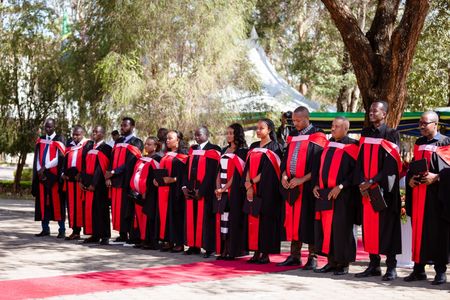
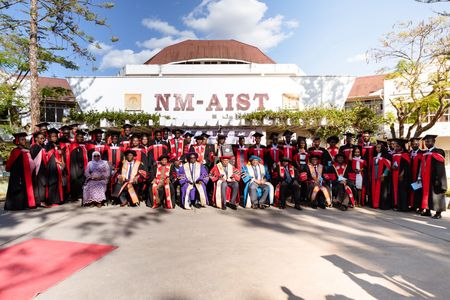
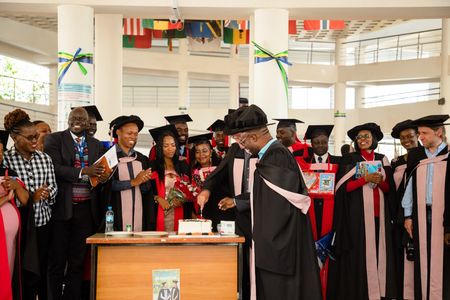
04.08.2022: dSkills@EA – CENIT@EA calls for Masters`Applications in Tanzania
The call for the 5th cohort for a Master Programme in Embedded and Mobile Systems at our partner university in Tanzania is now open. The programme with strong regional industry links equips students with in-demand skills and competences in a dynamic field. Graduates with a Bachelor`s degree or equivalent in the STEM field can now apply until November 15, courses will commence in January 2023. The EMoS programme i spart oft he Centre of Excellence for ICT in East Africa, CENIT@EA, that the VLBA department coordinates with international partners.
What is the EMoS Master Programme?
CENIT@EA is hosted by the Nelson Mandela African Institution of Science and Technology (NM-AIST) and located in Arusha in Northern Tanzania. For the fifth year in a row, the Centre offers a 2-year Master in Embedded and Mobile Systems that is geared towards the needs of the private and public sector in East Africa. The Master includes elements such as an internship, an applied Master thesis, Summer Schools, guest lecturers from the private and public sector, as well as Entrepreneurial and Soft Skills training. This enables the students to develop and marketize digital solutions, that are crucial for the transformation of industries and the development of the region.
The main academic goal of this programme is to strengthen teaching and research in Embedded and Mobile Systems in the EAC. The program is demand driven with industrial linkage in order to strengthen the entrepreneurial skills and the employability of graduates in this field. By closely cooperating with East Africanindustries, new opportunities are offered to graduates, as their skills are directly matched to the region’s needs.
Who can apply?
The call is aimed at graduates with a first academic degree in Science, Technology, Engineering or Mathematics (STEM) fields related to Embedded and Mobile systems, as well as professionals working already in the academia or private and the public sector. The CENIT@EA project especially aims to strengthen the role of women in STEM-related fields and the ICT sector. Female graduates are therefore particularly encouraged to apply.
How do I apply?
The admissions process is fully handled by NM-AIST. Interested students can apply for admission to the master programme in Embedded and Mobile Systems through the NM-AIST Online Admission System. You can find more information about required steps on the website of the Online Admission System.
For assistance or more inquiries on general admission applications to the EMoS programme at NM-AIST please write to admission@nm-aist.ac.tz or call +255 628 183 676 during office hours. You can also contact the CENIT@EA project office at the VLBA under .
Erasmus+ Project MORALE Steering Committee Meeting 28.06.22 - 30.06.22:
Project MORALE - Capacity Building for Curricula Modernization of Syria and Lebanese HEIs and Lifelong Learning Provision: Towards Sustainable NGO Management and Operation with Special Focus on Refugees conducted a Steering Committee Meeting from 28.06.22 - 30.06.22 in Athens, Greece.
Hosted by the Athens based NGO Four Elements, the project partners from Lebanon (Beirut Arab University; Modern University for Business and Science; Lebanese University), Syria (International University of Science and Technology; Arab International University; Damascus University; Sham Higher Institute for Islamic Science, Arabic Language, Islamic Studies and Research; Alrashid Association), Spain (University of Alicante), Italy (Alma Mater Studiorum Università di Bologna) and the University of Oldenburg held a face-to-face meeting for the first time since 2019.
The main objectives of the meeting were to report on the status and the future steps of the Curricula Enhancement and the Lifelong Learning Courses at the Syrian and Lebanese Institutions as well as the Training of Trainers Modules. Further face-to-face meetings are planned in September in Beirut and towards the end of the year in Alicante and at the University of Oldenburg.
The MORALE Project will be concluded in January 2023.
16.07.2022: INFRASense auf der Eurobike
Die Eurobike gilt gemeinhin als wichtigste Fahrradmesse in Deutschland. Neben den neuesten Produkten wurden vom 13.-17. Juli 2022 auch Zukunftstrends und Forschung(-sideen) zur Zweiradmobilität in Frankfurt präsentiert. Die drei hessischen Stiftungsprofessor:innen für Radverkehr haben im Zuge der Messe das Young Researchers Forum ausgerichtet. Mit dabei war auch das vom mFUND des BMDV geförderte Projekt INFRASense, das die Entwicklung einer Qualitätsbewertung für die Fahrradinfrastruktur vorsieht.
Im Rahmen der Postersession konnte VLBA Mitarbeiter Johannes Schering den Ansatz und erste Ergebnisse des Projektes mit weiteren Forschenden aus ganz Deutschland diskutieren. In der anschließenden Diskussion konnten Fragen beantwortet und neue Kontakte geknüpft werden. Wir bedanken uns recht herzlich bei Prof.in Martina Lohmeier, Prof.in Angela Francke und Prof. Knese für die Organisation des Forums.


07.07.2022: Four Elements meeting of the MORALE Project – June 28-30 2022
Management Meeting and Field Study Visit
“Capacity building for curricula modernization of Syrian and Lebanese HEIs and lifelong learning provision: towards sustainable NGOs management and operation with special focus on refugees/Morale.”
Hosted by Four Elements in Athens
After more than two years since the last face-to-face meeting due to Coronavirus (COVID-19) pandemic, a face-to-face meeting of the MORALE Erasmus+ partners was held at 4-Elements premises in Athens with the participation of all partners and the virtual attendance of AlRasheed Association and the external expert. Participants of all partners discussed the following:
- The meeting started by stating the progress that the MORALE project has achieved in meeting the indicators of each workpackage and the challenges.
- Rabih (UNIBO) gave a joint presentation with Dr. Alaa (AIU) about WP3 report, talking about the TOTs and their replications. He presented some indicators regarding TOTs and replications such as attendance, content, levels of trainings in both Lebanese and Syrian Universities, as well as their analysis, challenges and attendees’ evaluation of both TOTs and replications, and the results.
- Each partner HEIs has made two presentations; one on their curricula enhancement and the other on LLL course development.
- Soubhi presented administrative and financial Management issues. Administratively, an extension request was submitted to EACEA. Financially, efforts were made to secure the second instalment after being granted an exemption of the 70% condition after long discussions with the Lebanese NEO and EACEA.
- A tender to purchase project equipment for Lebanese HEIs was announced in Lebanon and in Syrian HEIs. Partners agreed to hold national seminars in Lebanon & Syria in September & study visits to Alicante & Oldenburg.
- Ali Khaddar (Alicante) presented NGO-related courses offered in EU and US universities & identified venues for improvement in the current curricula enhanced titles and content.
- Ester (4-Elements) has presented the results of TOTs’ replications satisfaction survey and a vitual meeting was held with the external quality expert.
A study visit to Elix NGO on the 3rd day was conducted to gain further insights into challenges that face NGOs working with refugees especially with children.
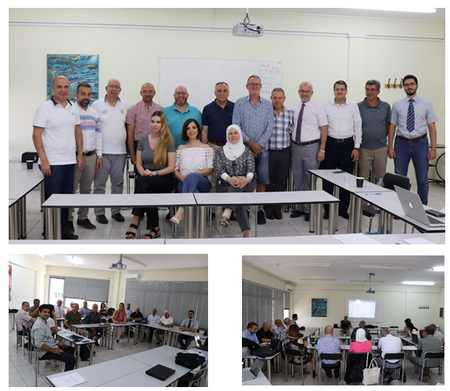
01.07.2022: SmartHelm und INFRASense stellen neue Ergebnisse auf nationaler Mobilitätstagung vor
Die beiden Fahrradprojekte SmartHelm und INFRASense haben neueste Forschungen der VLBA auf der 17. Jahrestagung des Arbeitskreises Mobilität und Verkehr der Deutschen Gesellschaft für Geographie (DGfG) präsentiert. Die Tagung fand in diesem Jahr unter dem Titel „(Im)mobilität in einer (post)pandemischen Welt“ am Institut für Geografie der Ludwig-Maximilians Universität in München statt. Die Auswirkungen der Covid Pandemie und insbesondere neue Initiativen zum Thema Fahrrad wurden in einer Vielzahl von Vorträgen sowie einer Postershow und einer Podiumsdiskussion diskutiert.
In der Session „Verkehrspolitik und Akzeptanz“ präsentierte VLBA Mitarbeiter Johannes Schering neue Ergebnisse aus dem INFRASense Projekt, welches die Entwicklung eines digitalen Bewertungsschemas für Radverkehrsanlagen vorsieht. Fahrradunfälle treten in Oldenburg zwar häufiger auf, in Osnabrück gibt es aber deutlich mehr schwere Unfälle, bei denen es sich oft um Alleinunfälle handelt. Infrastrukturmängel werden in Osnabrück besonders häufig zu fehlendem Grünschnitt (d.h. ein Busch oder eine Hecke wächst in den Radweg hinein) oder Falschparkern gemeldet.
In der Session „Erleben von Mobilität“, die von David J. Hölzel von der TU Dortmund moderiert wurde, zeigte Johannes Schering den neuesten Prototyp des intelligenten und vernetzten Fahrradhelms, der im Projekt SmartHelm entwickelt wird und zukünftig Fahrradkuriere bei der Arbeit unterstützen soll. Zudem wurde das SmartHelm Behavioral Data Repository, das die VLBA zur Bereitstellung der Daten sowie der Analyseergebnisse entwickelt, vorgestellt. Im Ausblick gab es noch eine Übersicht zu den kommenden SmartHelm Studien und der Zukunft von SmartHelm. Die anschließende Diskussion fokussierte sich vor allem auf ethische Fragestellungen, u.a. um die mögliche Überwachung sowie die Akzeptanz der Beschäftigten in der Fahrradlogistikbranche.
Insgesamt brachte die Diskussion mit anderen Forscher:innen und Forschern aus ganz Deutschland neue Impulse für die genannten Projekte. Die nächste Jahrestagung soll im kommenden Jahr an der Goethe-Universität in Frankfurt am Main stattfinden.

An der LMU München wurden kürzlich neue Ergebnisse aus den Fahrradprojekten SmartHelm und INFRASense mit der Forschungscommunity diskutiert. © David J. Hölzel
29.06.2022: Erasmus+ Project FREE Final Conference 21.06.22 - 23.06.22
The Erasmus+ Project FREE – Female Academic Role Model Empowerment, Equality and Sustainability at Universities in Mediterranean Regions: towards 20230 Agenda celebrated the impact and achievements of the project during the final conference, held in Amman, Jordan from the 21.06.22 - 23.06.22.
The consortium, consisting of two Syrian Universities (Arab International University, Damascus University), three Lebanese Universities (Lebanese University, American University Beirut, Modern University for Business and Science), two Jordanian Universities (University of Petra, Princess Sumaya University for Technology), two Spanish Universities (National Universidad de Educatión a Distancia, University of Alicante), one Lithuanian University (Vilnius Tech) and the University of Oldenburg, invited the Jordanian Minister of Culture, Mrs. Haifa Al Najjar, female academic role models from Syria, Jordan and Lebanon, as well as female decision makers to join the celebration.
Hosted by the two Jordanian Universities, UOP and PSUT, the project partners shared during the final conference the immense progress made through Project FREE in the area of Gender Equality at Universities in Syrian, Jordan and Lebanon. Project FREE started out in 2019 by sharing knowledge and building awareness for this topic through online courses covering an introduction to Gender Studies, Female Empowerment and Sustainability. Many thousands fe/male students, academics and decision makers attended the courses and laid the foundation for anchoring the topic of Gender Equality permanently at their universities. So, in Amman, the South-Mediterranean project partners could share with the participants their impressive achievements made during the course of the project: The founding and the activities of their Gender Equality and Sustainability Centers, their National Policy Papers on Gender Equality and the extensive network they were able to build within and beyond the academic sphere during the last three years.
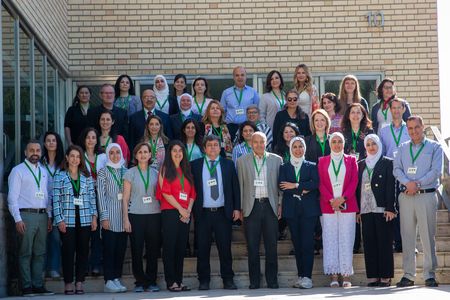
28.06.2022: 1st International Conference on Technological Advancement in Embedded and Mobile Systems, 24 – 25 Nov
The need for an Emerging Trends in Embedded and Mobile Systems (EMoS) scientific and technology conference has been widely discussed at higher learning institutions, with students, academics, and researchers finding it difficult to publish their fresh research discoveries. The 1st International Conference on Technological Advancement in Embedded and Mobile Systems (ICTA – EMoS) will give an opportunity to the previous mentioned group to do profound research on EMoS and publish their novel findings, but also engage participants into face-to-face discussions and exchange ideas in their areas of expertise and interest.
At the conference, accepted submitted scientific papers to ICTA – EMoS will be presented followed by a questions and answers session, also there will be a poster session where presenters will be available to respond on the raised questions.
Call for Papers
The conference covers all aspects of embedded and mobile systems and their applications. ICTA-EMoS draws researchers, application developers, and practitioners (industrial partners) from a wide range of embedded and mobile systems related areas such as Internet of Things (IoT), sensors, mobile applications development, etc. By promoting novel, high-quality research findings, and innovative solutions to challenging embedded and mobile application problems (EMoS), the conference seeks to advance the state-of-the-art in EMoS.
Paper submissions should be limited to a minimum of five (5) pages (mainly from industrial partners) and a maximum of ten (10) pages (academic researchers), in the Springer 1-column format including the bibliography and any possible appendices. Submissions longer than 10 pages will be rejected without review.
Review and Publication
All submissions will be triple-blind reviewed by the Program Committee based on technical quality, relevance to scope of the conference, originality, significance, and clarity.
A selected number of best papers will be invited for possible inclusion, in an expanded and revised form, in the the book “Advances, Trends and Applications in Embedded and Mobile Systems” published by Springer.
Deadlines for Submission of Papers
- Paper Submission: 31 July 2022
- Acceptance Notifications: 31 August 2022
- Camera Ready Submission: 31 September 2022
- ICTA-EMoS Conference: 24 – 25 November 2022
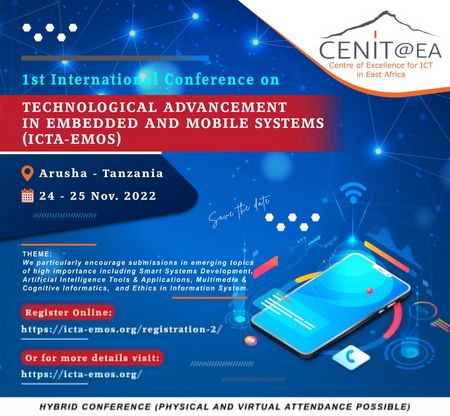
09.06.2022: NWZ-Beitrag über das PUUK Projekt
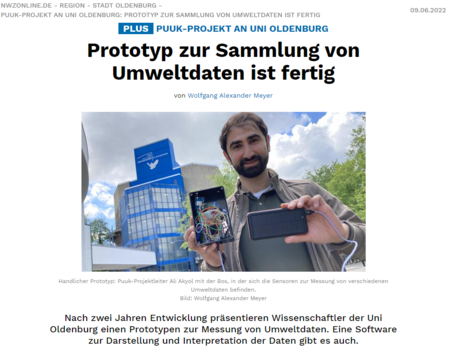
Wir freuen uns sehr, dass das PUUK Projekt mit den Ergebnissen Zuspruch in der Öffentlichkeit, Gesellschaft sowie in der Politik und Forschung erhalten hat.
Nach dem Beitrag haben sich sowohl Unternehmen als auch Forschungsinstitute bei uns gemeldet, die Interesse an dem Folgeprojekt und der Weiterentwicklung des Prototyps gezeigt haben. Wir bedanken uns ganz herzlich bei der NWZ um Herrn Meyer für das Treffen und der Berichterstattung.
Mit diesem Link gelangen Sie zum Artikel:
09.06.2022: Durchführung der PUUK Abschlussveranstaltung
Das PUUK Projekt wurde mit einer erfolgreichen Abschlussveranstaltung vorerst abgeschlossen. Die Veranstaltung wurde wie folgt durchgeführt. Begrüßung durch die Direktorin des Departments für Informatik der Universität Oldenburg, der Projektkoordinatoren, des Projektförderers der Deutschen Bundesstiftung Umwelt, unserem Ansprechpartner bei der Stadt Oldenburg Herr Hentschel und Prof. Dr. Jorge Marx Gómez, dem Projektkoordinator und dem Leiter des Lehrstuhls VLBA (Very Large Business Applications). Anschließend wurden die Projektergebnisse unter Betrachtung der Relevanz für Unternehmen, Kommunen und Bürger_innen dargestellt. Auch wurde der entwickelte Prototyp in Form von Umweltportal und Sensorbox präsentiert.
Abschließend wurde den Gästen die Gelegenheit gegeben sich in einer Diskussion zu äußern und die Entwicklung über das Projektende hinweg mitzugestalten.
Unter unseren Gästen durften wir auch Herrn Kruppa, dem Leiter des Arbeitskreises der 8. niedersächsischen Regierungskommission „Nachhaltige Umweltpolitik und Digitaler Wandel“ begrüßen.
Wir bedanken wir uns herzlich bei allen Projektpartnern für ihre wertvolle Mitarbeit, bei dem Arbeitskreis für ihre Feedbacks und der IHJO (Innovative Hochschule Jade Oldenburg).
Auch bedanken wir uns ganz herzlich bei allen Teilnehmer_innen für ihr Erscheinen bei unserer Abschlussveranstaltung. Ein Folgeantrag ist bereits in Bearbeitung. Ziel des Projektes wird es sein, den entwickelten Prototyp zur Marktreife zu bringen.
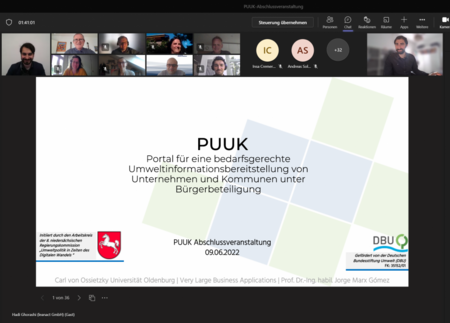
26.05.2022: dSkills@EA awards digital innovation in East Africa
After more than six months of polishing business ideas, on Thursday, 26 May, the start-up competition „Digital Innovations for Business Resilience in the EAC“ culminated in a Grand Finale in Kampala, Uganda. The competition was organized by GIZ and the Inter-University Council of East Africa (IUCEA) under the dSkills@EA – CENIT@EA umbrella.
Digital Innovations for Business Resilience in the East African Community aims to support young innovators at universities in the East African Community to develop and implement digital innovations for business resilience. Die Universität Oldenburg ist Projektkoordinator von dSkills@EA – CENIT@EA. The University of Oldenburg is project coordinator for dSkills@EA – CENIT@EA.
The twelve finalists were carefully picked amongst more than 1000 submissions and comprehensive rounds of national pitch events. They represented all six EAC Member States, the DRC having joined the EAC later. In the end, five teams were crowned at the Grand Finale in Kampala, Uganda.
During the Grand Finale, each of the 12 teams had five minutes to present their ideas to the Jury and present their solutions, plus a question round with the judges. The jury likewise represented the EAC Member States as well as the whole regional start-up ecosystem.

 |  |
10.05.2022: Projekttreffen/Workshop "5G Smart Country"
Am 10. Mai 2022 trafen sich die Projektpartner auf der Domäne Schickelsheim (nahe Braunschweig). Das Ziel war persönliche Begegnung der Projektpartner im Rahmen eines Workshops und Ortstermins, um miteinander den Projektfortschritt zu diskutieren und sich die laufenden agrartechnischen Feldversuche des Teilprojektes „Smart Farming“ anzuschauen. Der Kontakt zwischen den Projektpartnern war bis dann Pandemie-bedingt nur auf Online-Kommunikation beschränkt. Dieser Workshop gab allen die Möglichkeit, in einer offenen Atmosphäre sich auszutauschen. Neben den verschiedenen Führungen haben die Projektpartner auch in kleineren Gruppen den Projektfortschritt diskutiert. Der Workshop endete mit einer Abschlußrunde, wo neben der Berichtserstattung über das Projekt und die erreichten Meilensteine auch Ergebnisse der Gruppendiskussionen präsentiert und in einer offenen Diskussionsrunde verschiedene Projektthemen erörtert wurden.
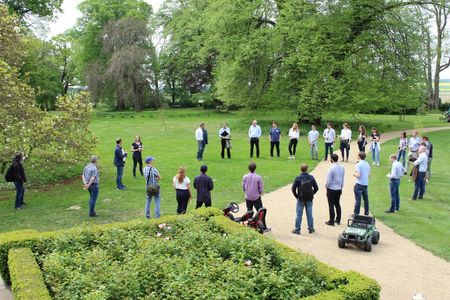 | 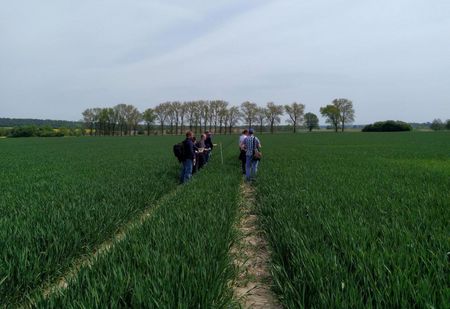 |
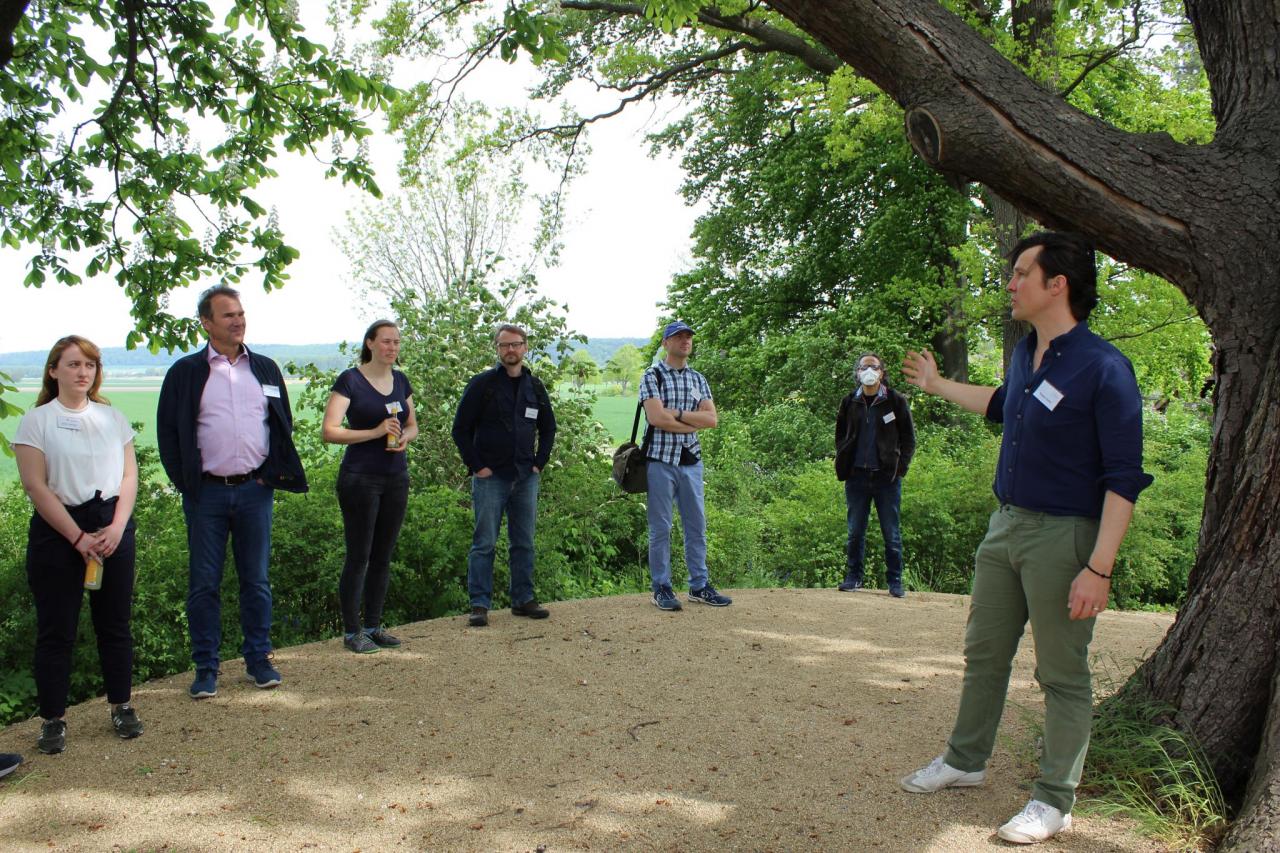 | 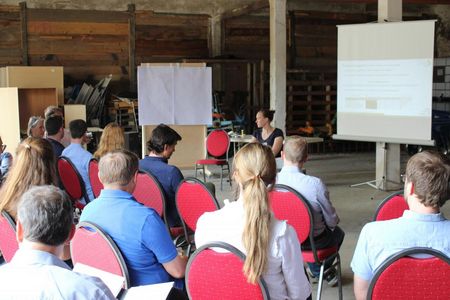 |
09.05.2022: FREE Project Training and Management Meeting in Vilnius, Lithuania
On the 09.05.2022 project partners of the Erasmus+ project FREE (Female Academic Role Model Empowerment, Equality and Sustainability at Universities in Mediterranean Region: towards 2030 Agenda) joined together at the Vilnius Gediminas Technical University, Business Management Faculty, in Lithuania for a FREE training day and a management meeting.
Project partners from Lebanon, Syria and Jordan shared their progess on writing National Policy Papers on Gender Equality, their experiences with their newly founded Gender Equality Centres and had the chance to disseminate the successes of the project widly during the ongoing International Week at Vilnius Gediminas Technical University.
At the end of May FREE trainings will continue during a week of workshops at the Universidad Nacional de Educación a Distancia (UNED) in Madrid, Spain.
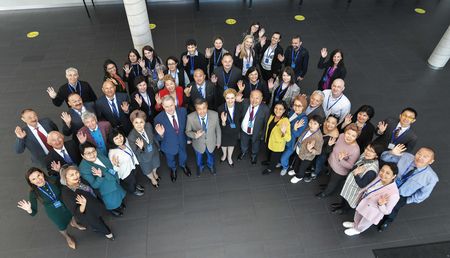
05.05.2022: Oldenburg site visit takes a closer look to smart cycling innovations in Northwestern Germany
This article was written by Johannes Schering, Zora Becker, Janika Hintzsche & Roland Hentschel.
Although we get used to online meetings in the past years and its potential to avoid unnecessary traveling, the physical exchange is important to understand the different perspectives in an interdisciplinary project like BITS is. The Corona restrictions in the North Sea Region are slowly relaxing what gave room for realizing a smaller scale site visit at the BITS partners in Oldenburg. In one and a half days the BITS project managers Ronald Jorna and Robin Kleine learned a lot about existing and forthcoming smart cycling initiatives by the city of Oldenburg, baron mobility service GmbH (baron) and the University of Oldenburg (Department of Business Informatics VLBA).
Baron Mobility service
There is not only a lot of research on the cycling domain in the Northwestern part of Germany, but also a lot of SMEs that push forward new cycling related business models. Ronald Bankowsky, the founder and innovator of baron, presented his new company and the related business potentials at the meeting at the inner city office of baron. The new company Fast2Work has launched two data-based mobility applications. The Bike Tour Guide (biketour.guide) is a free bike navigator and route planner. The website SteigUm.depersonally converts the switch from car to bike into vacations, fitness etc.
As part of their BITS participation, baron will provide the Changers CO2 Fit app to its corporate customers as another ITS implementation. Team competitions as internal company challenges are intended to motivate employees to cycle (more) by making it more fun. The app records the traveled distances and calculates the CO2 savings compared to the car, as Janika Hintzsche from baron mentioned in her presentation.
City of Oldenburg
The new business idea was also a connection point to the activities of the city of Oldenburg. Since the beginning of April 2022, the new bike sharing service OLi Bike is available to the general public. Kerstin Goroncy, the cycling coordinator of the city of Oldenburg, explained in detail how the new offer and its organization works. Commuting is an important topic in Oldenburg. With the same motivation as Fast2Work and baron, more employees from the surrounding area should switch from car to bike more often on their way to work. Part of this solution are infrastructure based ITS solutions to make cycling more attractive. The thermal imaging camera systems are able to detect a group of cyclists to prioritize these at traffic lights.

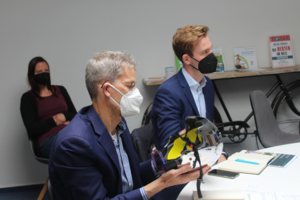
University of Oldenburg (Department of Business Informatics VLBA)
Part of the municipal ITS solutions are also the induction slopes based bike counting systems. The collected data is processed by the scientific team at the University of Oldenburg (VLBA) as part of the Bicycle Data project as one of the BITS implementations. In this context research associate Johannes Schering introduced to the smart cycling innovations where the University is strongly engaged. Johannes explained the functions of a first prototype of SmartHelm - the project develops an awareness sensitive bicycle helmet that includes a headup display to provide relevant information in the cargo bike city logistics context based on measured distractions by biophysical sensors. The VLBA department is actually working on a new data portal (Behavioral Data Repository) to provide new cycling KPIs and awareness-sensitive open biophysical data consisting of EEG, eye tracking and GPS data. The recently started project INFRASense is working on a data driven assessment methodology for the bike infrastructure to support cities in the cycling promotion process. In this context the University is building up a cycling data lake that consists of citizen sensor data, traffic data, infrastructure data, accident data, reportings etc. New cycling KPIs on bicycle accidents and reportings on infrastructure shortcomings enable the comparability of different cities in terms of (perceived) traffic safety. SmartHelm and INFRASense are both funded by the German Federal Ministry of Digital and Transport as part of the mFUND programme that supports digital innovations in the mobility sector since 2016.
Bike tour
The site visit was rounded off by a practical experience of the bike infrastructure as part of the bike tour. According to the Changers app, the duration of the trip was 17.3 km while 3.3 kg CO2 was saved. The participants perceived the strengths and weaknesses of the bicycle infrastructure in Oldenburg. Part of the tour was also a closer look to the accident hotspots in the city area. The project managers from the Netherlands were surprised to learn that it is very common in Germany to put a white bicycle (the so called “Ghostbike”) to accident points in silent memory to cyclists who were killed at this location. There is still a lot to do in the cycling promotion process - not only but also in the field of cycling data collection. All in all, although the number of participants was limited, the live meeting was a great experience after such a long time. We are looking forward to the next live steering group meeting in Aarhus (Denmark) in June.

02.05.2022: NEMo diskutiert mit anderen Projekten zum Thema ländliche Räume
Vertreter:innen aus der Praxis diskutierten mit NEMo über kommende Entwicklungspfade der Mobilität im ländlichen Raum. © hri (Wildeshauser Kreiszeitung)
Der Landkreis Oldenburg weist durch seine Pendlerbeziehungen ins Umland eine starke Mobilitätsproblematik auf. Neue Konzepte sind erforderlich, um die Herausforderungen, die in diesem Bereich bestehen, in den kommenden Jahren angehen zu können. Zum Thema „Mobilität im ländlichen Raum“ veranstaltete die CDU in Wildeshausen unter Beteiligung des NEMo Projektes (Nachhaltige Erfüllung von Mobilitätsbedürfnissen im ländlichen Raum) eine Diskussionsrunde mit Praktikern und interessierten Bürger:innen.
Johannes Schering und Cedrik Theesen stellten die wichtigsten Ergebnisse des 2020 abgeschlossenen Projektes vor. Prof. Jorge Marx Gómez war online zugeschaltet, um weitere Einblicke in die Forschungsarbeit zu geben. Die Fahrkreis-App verknüpft den ÖPNV sowie weitere Mobilitätsangebote mit privaten Verkehren. Bürger:innen können so das verfügbare Angebot erweitern, was für viele Institutionen (z.B. Betriebe, Schulen) interessant sein kann, um der Herausforderungen der Mobilität im ländlichen Raum und der starken Abhängigkeit vom privaten Pkw entgegen wirken zu können. Auch der Fahrradverkehr spielt beim Mobilitätswandel eine wichtige Rolle. In diesem Kontext wurden auch die Projekte SmartHelm und INFRASense den interessierten Zuhörer:innen vor Ort und im Internet näher gebracht.
Die Wildeshauser Kreiszeitung hat zu der Veranstaltung einen Artikel veröffentlicht, den Sie hier finden können.
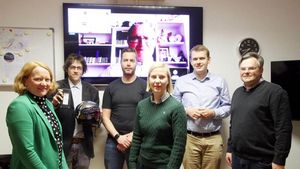
27.04.2022: „MobiLe - Mobilitätswende @ Lebensqualität“ Kick-off Meeting
On April 27th, 2022, Kick-off Meeting for „MobiLe - Mobilitätswende @ Lebensqualität“ project took place in presence at the University of Oldenburg. The cooperation partners Stadt Norderstedt and associated partners Mosche Design attended to this kickoff meeting. Tasks achieved in Phase 1 and goals to reach in Phase 2 are addressed at this meeting. Furthermore, certain MobiLe-related projects (SmartHelm, INFRASense) were discussed, and online meetings will be held regularly to share information about other relevant projects.
This research project mainly aims to provide a novel decision support tool for transport-related decisions that consider the transport system together with other aspects of a qualitative urban development aiming at sustainability in their systemic interaction.
The VLBA's main responsibilities for this project are to develop and host a website and web app that enables local politicians to perceive and consider the complexity and interdependencies of the municipal transport system (better) through easy-to-use software. It will also enable local politicians to assess the complex impacts of transportation-related decisions independently and at an early stage.
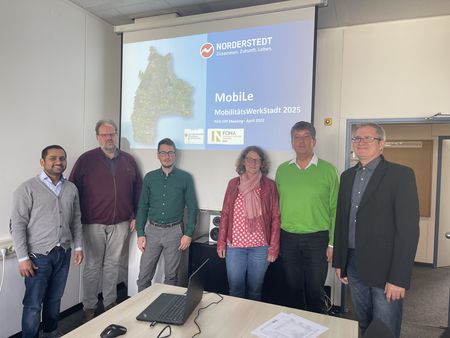
Partners involved
- Stadt Norderstedt
- Carl von Ossietzky Universität Oldenburg
Associated Partners
- MOSCHDESIGN
- e-fect dialog evaluation consulting eG
The overall project is managed by the Stadt Norderstedt as an in-house effort.
29.04.2022: 12. BUIS-Tage 2022 (Fristverlängerung)
Aktualisierung: Fristverlängerung zur Einreichung (neue Frist 22.05.2022)
Bemühungen um Umweltschonung, Nachhaltigkeit und Energieeffizienz werden durch den Einsatz von Umweltmanagementsystemen unterstützt, die eine Vielzahl heterogener Daten benötigen, um der Planung, Steuerung und Kontrolle von umweltbezogenen Aufgaben gerecht zu werden. Diese Daten müssen durch Betriebliche Umweltinformationssysteme (BUIS) vorgehalten und zielorientiert bearbeitet werden. Die Leistungsfähigkeit aktuell implementierter BUIS wird den Anforderungen aus der Nachhaltigkeitsdebatte noch nicht gerecht. Dabei kommt der IT eine entscheidende Rolle in der nachhaltigen Unternehmensentwicklung zu. BUIS müssen bereits in der Produktentwicklung im Rahmen einer umweltintegrierten Produktion sowie in der strategischen Entscheidungsfindung ansetzen und nicht erst als End-of-Pipe-Lösung zur bloßen, nachträglichen Dokumentation von Umweltkennzahlen oder um Legal Compliance herzustellen. Große Bedeutung kommt somit dem rechtzeitigen Erkennen von Ursache-Wirkungsbeziehungen zu, um von einem abstrakten Standpunkt aus die Umweltwirkungen des eigenen Handelns innerhalb des Unternehmens (aber auch über Unternehmensgrenzen hinaus) abzuschätzen und proaktiv zu begegnen. Wesentliche Potenziale für den vorsorgenden Umweltschutzaspekt bleiben sonst ungenutzt.
Der Workshop versteht sich als ein Forum, um über den erreichten Stand aktueller BUIS zu informieren sowie neue, eigene Ideen und Lösungsansätze vorzustellen und in einer Expertenrunde aus Wissenschaft und Praxis mit angenehmer Diskussionskultur intensiv zu erörtern. Selbstverständlich sind auch Arbeitsberichte, die auch Teilergebnisse und vor allem auch noch ungelöste Problemstellungen thematisieren, herzlich willkommen.
21.04.2022: Disputation of Alexander Sandau
On April 21st, 2022, Dipl.-Inf. Alexander Sandau successfully defended his dissertation with the title "Design of a product service management system bundling of services in the mobility services market". The Department of Information Systems VLBA and the OFFIS institute congratulate him.
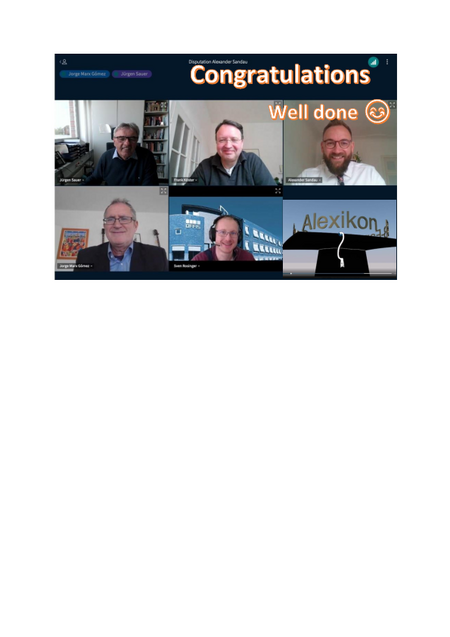
04.04.2022: WiPMA final presentation
Everything is coming to an end, including the work of the WiPMA project group.
On 04.04.2022, the project group successfully presented its findings in the areas of Data Understanding, Machine Learning, Architecture and Visualization in a final presentation. The project group was able to gain a lot of experience within one year, which brought ups and downs, whereby the ups such as the collaboration and the sense of achievement outweighed the downs.
The project group would like to thank the members of the WiSA Big Data project, the representatives of OFFIS e. V., the industry partners and those who followed the project with interest. We hope that our findings and the outlook into the future will open new perspectives for further projects.
30.03.2022: Update from East Africa: 4th Cohort starts and 3rd Cohort interns
Student life at the Centre of Excellence for ICT in East Africa (CENIT@EA) that the University of Oldenburg coordinates within an international partnership, is moving ahead. With the beginning of this year, the fourth cohort of students enrolled in the Masters programme in Embedded and Mobile Systems. The students from the previous, third cohort, just started their internships in the East African Region.
On 14 January 2022 the fourth cohort of students took up their studies at Nelson Mandela African Institution of Science and Technology (NM-AIST) in Arusha, Tanzania. Amongst the 30 new students and were 24 scholarship holders. Four students each from each of the six EAC member states receive full scholarships for the duration of their studies. The scholarships awarded by the project include a monthly living allowance, rent assistance and financial assistance for studies and research, and also cover the tuition fees applied at NM-AIST. Of the 24 scholarship holders, nine are female. With this fourth cohort, the Centre of Excellence has in total offered 112 scholarships for the Masters programme in Embedded and Mobile Systems.
The previous cohort is at a further stage now, having started their internships. The two-year Masters programme contains a compulsory industry placement for all of its students. The main objective of the industrial internship is to promote regional cooperation and linkage with the industries, with a strong focus on technology, innovation and entrepreneurship. The students also get the chance to gain additional practical experience and extend their network. The internships last six months and can be done at any private or public institution in the EAC region that fits the programme. During their placement the students carry out their own practical project that is submitted after their stay, while being support by a host supervisor within the company, NGO or public institution as well as an academic supervisor. The third cohort started their internships in February 2002 and will accordingly finish in August this year.
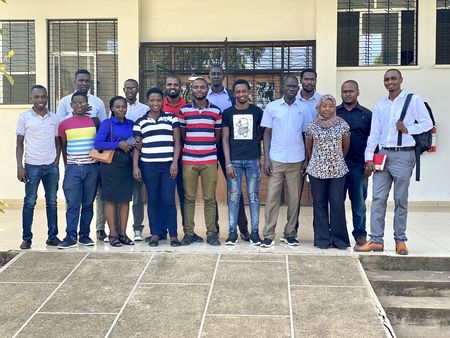
29.03.2022: 2nd consortium meeting of the project 'Wärmewende
Nordwest'
On 09.03.2022 the 2nd consortium meeting of the project 'Wärmewende
Nordwest' took place. The topic of the meeting was, after a
a short presentation of the current status of all research fields and
activities, the preparation of the first interim report and a presentation of the
and a presentation of the BFE about digital learning media, their methods,
technologies and possible applications.
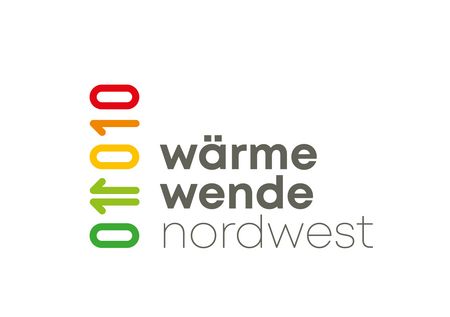
17.03.2022: Product of the Year 2022 (Materialfluss)
For quite some time now, we have been working together with abat AG on the automation of inventory through the use of drones and AI. After our results have already been published scientifically, it is now also clear that the approach is also finding favor in practice. We have now been awarded the title "Product of the Year 2022" by the magazine Materialfluss.
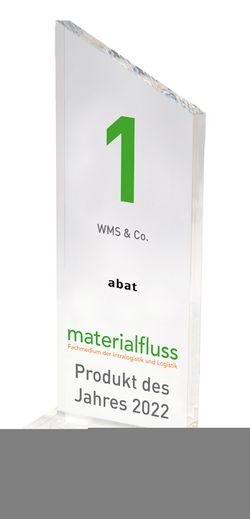
03.03.2022: Guest researcher in the department
The VLBA department welcomes Gladys Nkatha Mange. She is with us for 6 months on a DAAD short-term fellowship and comes from the Jomo Kenyatta university of Agriculture and Technology in Kenya. Her research focus is Optimal Image Restoration with a Convolutional Neural Network.
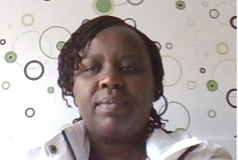
24.02.2022: 13. BUIS-Tage 2022
Bemühungen um Umweltschonung, Nachhaltigkeit und Energieeffizienz werden durch den Einsatz von Umweltmanagementsystemen unterstützt, die eine Vielzahl heterogener Daten benötigen, um der Planung, Steuerung und Kontrolle von umweltbezogenen Aufgaben gerecht zu werden. Diese Daten müssen durch Betriebliche Umweltinformationssysteme (BUIS) vorgehalten und zielorientiert bearbeitet werden. Die Leistungsfähigkeit aktuell implementierter BUIS wird den Anforderungen aus der Nachhaltigkeitsdebatte noch nicht gerecht. Dabei kommt der IT eine entscheidende Rolle in der nachhaltigen Unternehmensentwicklung zu. BUIS müssen bereits in der Produktentwicklung im Rahmen einer umweltintegrierten Produktion sowie in der strategischen Entscheidungsfindung ansetzen und nicht erst als End-of-Pipe-Lösung zur bloßen, nachträglichen Dokumentation von Umweltkennzahlen oder um Legal Compliance herzustellen. Große Bedeutung kommt somit dem rechtzeitigen Erkennen von Ursache-Wirkungsbeziehungen zu, um von einem abstrakten Standpunkt aus die Umweltwirkungen des eigenen Handelns innerhalb des Unternehmens (aber auch über Unternehmensgrenzen hinaus) abzuschätzen und proaktiv zu begegnen. Wesentliche Potenziale für den vorsorgenden Umweltschutzaspekt bleiben sonst ungenutzt.
Der Workshop versteht sich als ein Forum, um über den erreichten Stand aktueller BUIS zu informieren sowie neue, eigene Ideen und Lösungsansätze vorzustellen und in einer Expertenrunde aus Wissenschaft und Praxis mit angenehmer Diskussionskultur intensiv zu erörtern. Selbstverständlich sind auch Arbeitsberichte, die auch Teilergebnisse und vor allem auch noch ungelöste Problemstellungen thematisieren, herzlich willkommen.
19.02.2022: Visit of the DigiSchwein project group to the Chamber of Agriculture in Wehnen
For the first time, the students were able to gain insights into the various experimental fields of the DigiSchwein project. After a friendly welcome from the Chamber of Agriculture and a general introduction, there was a detailed tour of the various fattening and sow pens at the site. Here, the students were given detailed insights into the various digitization activities in the barn that are being carried out and investigated as part of the DigiSchwein project. In addition to camera installations above the pen to record video footage for automated evaluation of animal behavior and the installation of various climate sensors in the pen to record temperature and pollutant levels, there was also a great deal of information about the general husbandry practices and character traits of pigs. Interested parties can also get an impression of the digitalization measures in the barn under this link.
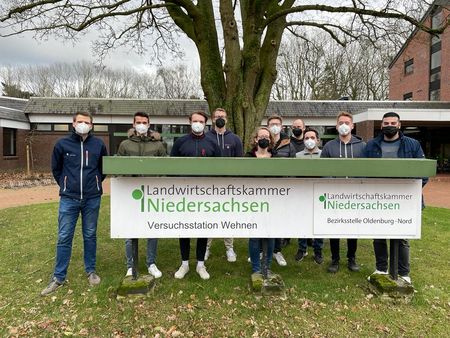
17.01.2022: "5G Smart Country" Kickoff Meeting
On 17.01.2022 the project "5G Smart Country" officially started with an online kickoff meeting. This project is conceived as a living lab and is conducted by a consortium of research institutes and agricultural and biosystems engineering firms. The project aims at investigating the promising possibilities of the 5G cellular technology in real-world scenarios in agriculture and forestry (smart agriculture and smart forestry). The project envisages the design, development, and testing of specific 5G applications aimed at increasing productivity in farming and forestry while ensuring an optimum use of natural resources as well as chemical substances and minimizing the environmental impact. Automation engineering, data science and artificial intelligence (AI) will be playing a key role here, for instance, field robots and remote sensing drones for an efficient sowing, controlled fertilizing, mechanical weeding, and wildlife observation; spectroscopic real-time quality assessment of the harvest: smart harvesting. VLBA with its extensive experience in these fields is part of this project and will be primarily responsible for the development of algorithms for data analysis and AI-based automation, and data visualization.
Participating Partners:
- Deutsches Zentrum für Luft- und Raumfahrt e.V.,
- Julius-Kühn-Institut für Kulturpflanzen (Institut für Anwendungstechnik im Pflanzenschutz),
- Landwirtschaftskammer Niedersachsen,
- Ostfalia Hochschule,
- Rauch Landmaschinenfabrik GmbH,
- Strube D&S GmbH,
- Technische Universität Braunschweig (Institut für mobile Maschinen und Nutzfahrzeuge, IMN),
- Thünen-Institut für Waldökosysteme,
- Universität Oldenburg (Chair of Very Large Business Applications, VLBA),
- Wahlers Forsttechnik GmbH & Co.KG.
Associated Partners:
- Domäne Schickelsheim
- Niedersächsische Landesforsten
- Rittergut Lucklum
- Stiftung Zukunft Wald
The overall coordination of the collaborative research project will be conducted by a steering committee formed by the two counties involved in this pilot project, Wolfenbüttel and Helmstedt.
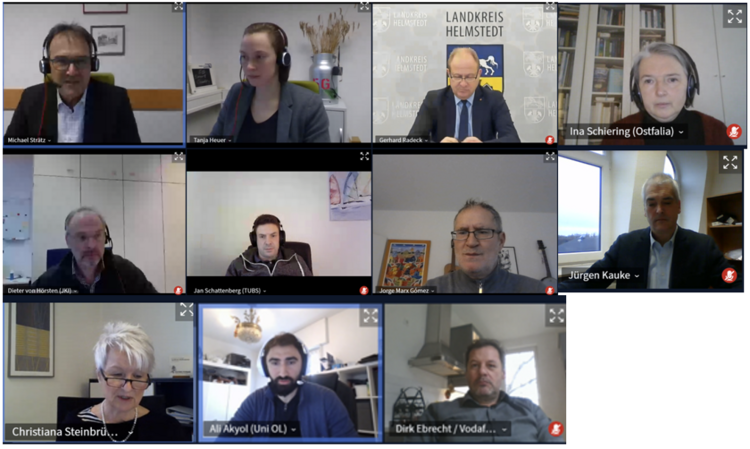
VLBA presentation on the kickoff meeting:
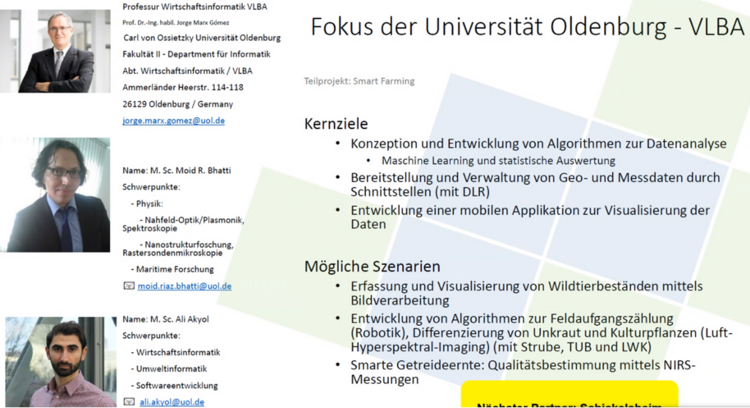
HAPTIK project closing meeting
Last December, the final project meeting of the BMWI-funded project HAPTIK took place. The project team presented the results and findings of three years of research to representatives of the ministry, the project management agency and the accompanying research agency. The research project has resulted in over 50 publications in the fields of law, computer science and project management as well as a dissertation and various student theses.
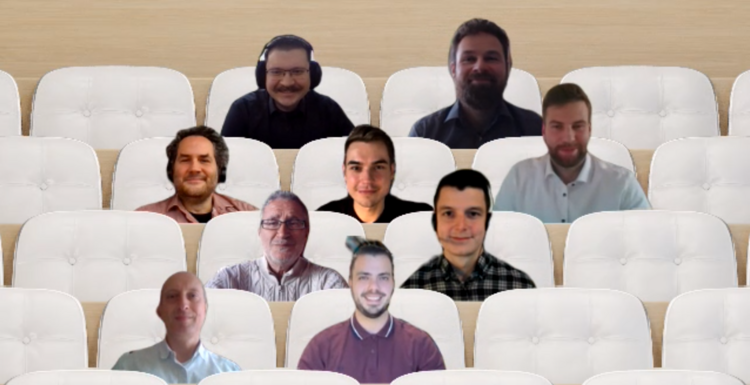
The results and the commitment of the project team were also acknowledged by the ministry by naming HAPTIK as one of the lighthouse projects of the funding line. Although this was the project's final meeting, the project is not completely finished. The University of Oldenburg will be working on further evaluation of the results through a cost-neutral extension until 31.03.2022.

